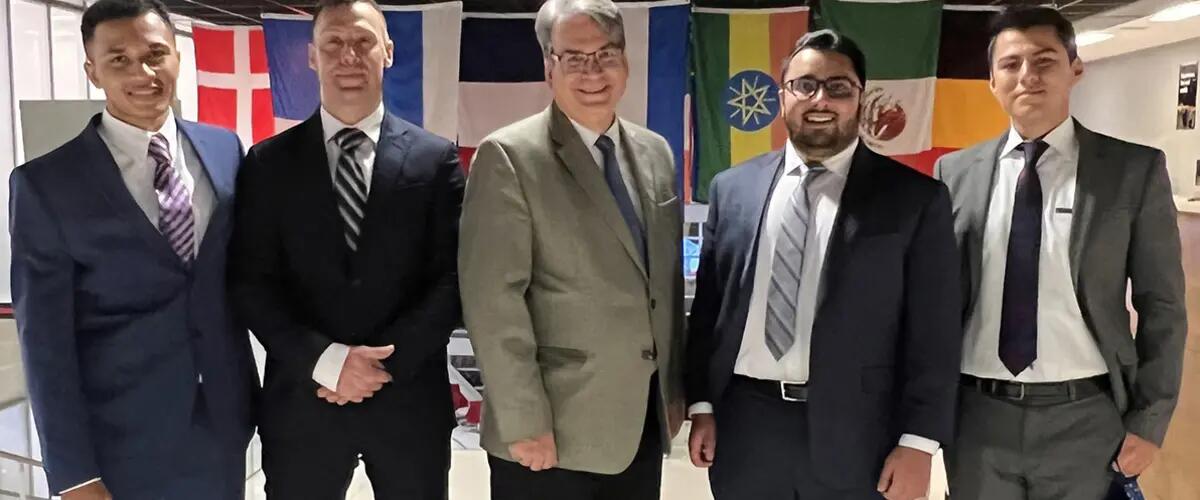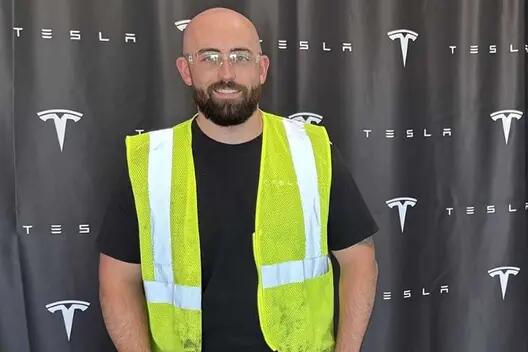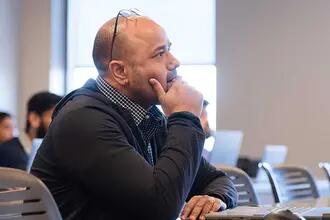
MBA students Nicholas Felli, Thomas Parker, Neil Gajjar and Joseph Russomanno with Doug Miller, associate dean for MBA programs (center).
MBA students win first place at international case competition
During one of Tom Parker’s first job interviews as an MBA student, the pharmaceutical executives he met with encouraged him to do a case competition.
He took their advice, jumping at an invitation from a friend to be part of a team of MBA students representing Rutgers at the Tepper School of Business International Case Competition at Carnegie Mellon University. The Rutgers MBA team won first place, giving Parker a new talking point for future interviews.
“I wanted to see what I could accomplish in a situation like a case competition,” said Parker, who became the team captain. Turns out, he proved something to himself: “In the cauldron of pressure,” he said, “I flourished. We all did.”
Parker and his teammates – Nicholas Felli, Neil Gajjar and Joseph Russomanno – were dubbed the “come-back kids,” by Joe Slota, an executive-in-residence at Rutgers Business School who coached them. To the team, Slota was a “huge motivator,” Parker said.
The Tepper competition centered on a major business issue caused by the COVID-19 pandemic for the tech sector. Students were asked identify how Honeywell (the competition sponsor) could better navigate through a period of troubling semi-conductor shortages.
Case competitions are considered important experiences for MBA students because they require them to apply their classroom knowledge to solve business problems, typically, as in the Tepper competition, one taken from real life.
In the Tepper case, the teams had a total of eight days to prepare for the competition once they received the prompt. The Nov. 19-20 competition involved 25 teams, including students from Tepper, the McDonough School of Business (Georgetown University), Kelley School of Business (Indiana University), Marshall Business School (University of Southern California) and the National University of Singapore.
The Rutgers MBA students spent eight days creating and refining a power point deck that would present the team’s examination of the problem in a well-polished 15-minute virtual presentation.
The delivery of the presentation and what went into it ended up differentiating the Rutgers team. Parker said the team familiarized themselves with Honeywell’s businesses. To get an idea of how the company had already responded to the shortages, they listened to an earnings call to hear the CEO’s remarks to investors.
“We didn’t want to go up there and offer ideas that the company already had,” Parker said. “We wanted to know what Honeywell was already doing. That gave us a leg up.”
The students drew on the supply chain knowledge of teammate Joseph Russomanno whose contributions also included saving the team’s ability to compete when he stepped in to fill a sudden vacancy when another student had to drop out.
In their presentation, the Rutgers students included some other differentiating elements. They explained how Honeywell could improve its relationships with suppliers, and they looked around at what other companies were doing in response to semi-conductor shortages, including one major’s tech company’s move to refocus business operations until the situation eased.
“We identified answers. We backed things up with facts,” Parker said. “We wanted to keep it simple and straightforward. We brought a clear picture together, and the judges were able to connect the dots.”
The strategy worked. The Rutgers MBAs advanced to the final round where they won the first-place prize of $7,500. Students from the University of Southern California won second, and a team from the National University of Singapore was the third-place winner.
Slota, the Deloitte executive who coached the team, said he was hard on the students, especially at the start. “There were some rough spots,” he said, “but they believed in each other. They listened to feedback and adjusted things.”
Slota said he was impressed by the group’s cohesion, resilience, and determination to win. “This,” he said, “is exactly what Rutgers Business School should be known for.”
Press: For all media inquiries see our Media Kit


